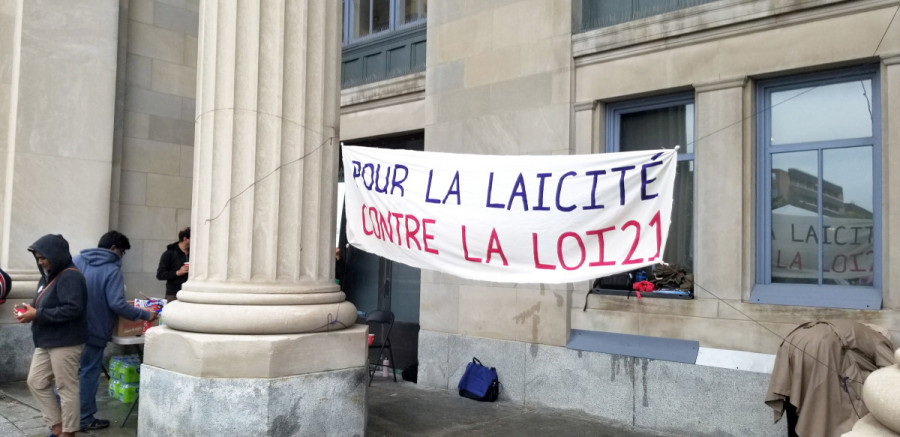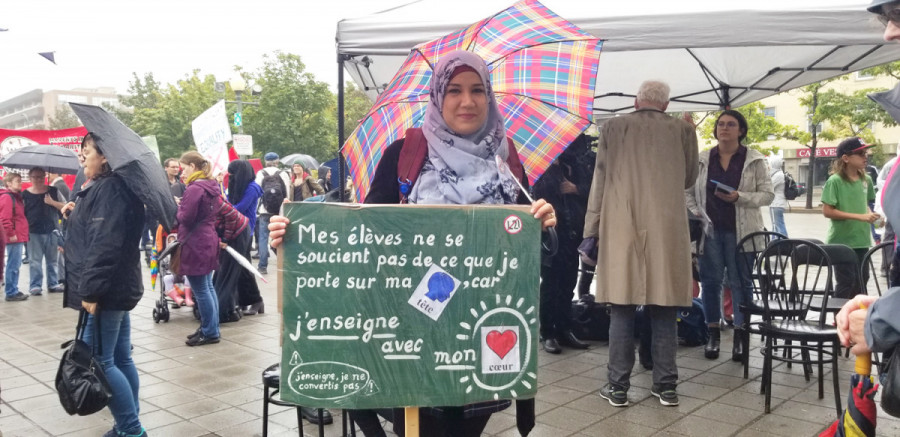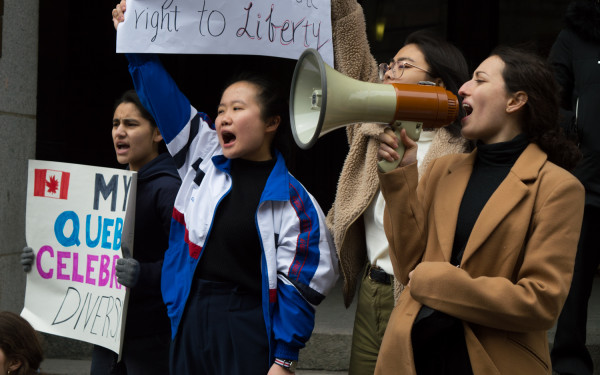Protests Denouncing Secularism Law Continue
Protesters Say They Won’t Stop Until Law is Changed
Since the passing of Bill 21—a law banning, among others, teachers and public service workers like judges from wearing religious symbols—in June, Mahida Gabriel has been harassed on the street and told to “go back home” by strangers.
“This is my home,” she said. “I was born here. This is my country.”
On Saturday afternoon, around 100 people protested the controversial bill outside of Parc metro station despite the rain.
Protesters held signs that read “neutrality should also mean equality” and “I decide my clothes, my career, my future.”
The event included music, food, coffee and big pins with a strike-through the words “Loi 21”, handed out by protesters donning hijabs, niqabs, and kippahs along with unveiled allies.
On stage, CSDM English teacher and member of the group Droit d’enseigner au Québec pour toutes et tous, Bouchera Chelebi explained the event aimed to unveil the impact of Bill 21 for both those affected and those who are not.

She said the law aims to deprive certain citizens of their fundamental rights.
“Women are harassed in the streets and in public areas,” she said. “We haven’t seen such a wave in islamophobia, antisemitism, or plain racism as we see nowadays.”
She said teachers are overstressed and anxious because some parents believe that the bill gives them power to choose who will and who will not teach their kids—even though the government stated that this is not the case.
“Most people don’t know what it’s about,” said protester Harjinder Singh. “They say [it affects] teachers and judges, but it’s a bigger picture. It’s a problem with visible minorities.”
He explained that the bill creates a hierarchy, where minority groups donning veils, turbans and other religious symbols are at the bottom.
He added that a lack of representation in the media continues to create a divide between those affected by the law and those who are not.
Most people don’t know what it’s about. They say [it affects] teachers and judges, but it’s a bigger picture. It’s a problem with visible minorities.
—Harjinder Singh
Advertised as a family gathering, children were accompanied by their parents.
Holding both a Canadian flag and the Montreal flag, protester Gabe Engson said the bill is legislative discrimination. To Engson, the flags represented the Charter of Rights and Freedoms.
The Montreal flag—which has recently been adapted to include a white pine as a totem for Indigenous Peoples—represents multiculturalism, said Engson.
“It’s an innately Canadian concept,” he said. “Official bilingualism, official multiculturalism, and it’s completely against what rural Quebec wants.”
Bill 21 was passed using Section 33 of the Charter, the notwithstanding clause, which allows provincial legislatures to temporarily override sections of the Charter.
Protesters argued that the use of the notwithstanding clause is unconstitutional.
“Using [the notwithstanding clause] is very inappropriate,” said Engson. He stated that using the clause means that courts cannot even rule if the bill is unconstitutional or not, and is an admission that the bill is going against the Charter.
Premier Francois Legault has previously stated that the secularism law is a “moderate approach to an old problem,” and claimed it would relieve religious tensions.
The National Assembly also invoked closure to make sure the law was passed before going into recess, effectively ending all discussions around it.
“Using Section 33 and invoking closure [are] all admissions that it’s not a moderate bill,” said Engson. “If the courts can’t even decide upon it, then how the hell is this bill legitimate?”
A previous version of this article features a misspelling of Harjinder Singh’s name in which it read Harjinger Singh. The Link regrets this error.




_600_375_90_s_c1.jpg)


